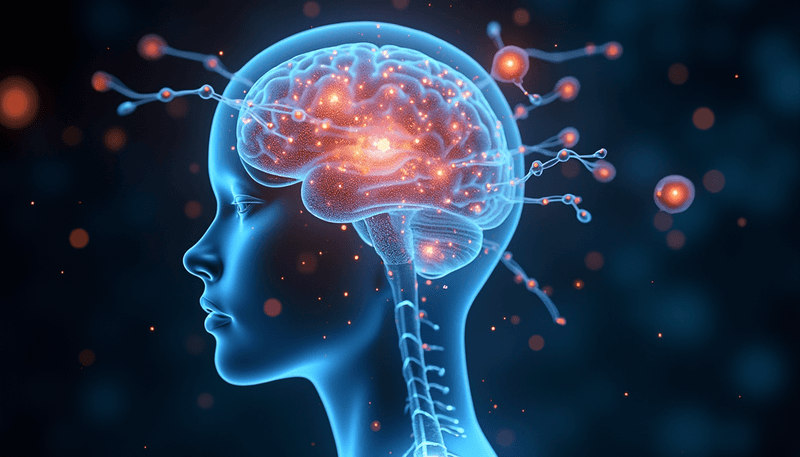Mental Health Changes During Menopause Journey

Standing in my kitchen one morning, I suddenly felt an overwhelming wave of anxiety wash over me, followed by an intense hot flash. As both a medical professional and a woman approaching perimenopause, I understand firsthand how challenging these transitions can be. Recent research published in the Indian Journal of Clinical Psychiatry reveals that mental health changes during menopause are not just "in your head" - they're backed by science.
The Hidden Connection Between Hormones and Mood
When it comes to menopause, most women know about hot flashes and night sweats. But what many don't realize is how profoundly changing hormone levels affect our mental wellbeing. As estrogen levels fluctuate and eventually decline, it impacts multiple brain systems involved in mood regulation and cognitive function.
"Have you noticed changes in your mood or thinking that seem to coincide with other menopause symptoms?"
The science reveals that over 40% of women experience depressive symptoms during perimenopause. This isn't simply about feeling sad - it's about real chemical changes in your brain. Estrogen helps regulate serotonin and other neurotransmitters that influence mood. Think of estrogen like a conductor in an orchestra - when the conductor's movements become erratic, the music (your mood) becomes less harmonious.
What you can do:
- Track your mood changes alongside physical symptoms
- Practice stress-reduction techniques like deep breathing or meditation
- Consider speaking with a mental health professional who specializes in perimenopause
- Discuss hormone therapy options with your healthcare provider if symptoms are severe
The Sleep-Mood Connection
More than half of women report sleep problems during menopause. This isn't just about feeling tired - poor sleep can trigger a cascade of mental health effects. Think of sleep as your brain's cleaning service - without proper rest, mental "clutter" accumulates, affecting your mood and cognitive function.
"How has your sleep changed recently, and what impact has it had on your daily life?"
Research-backed sleep strategies:
- Keep your bedroom cool (helps with night sweats)
- Maintain consistent sleep and wake times
- Limit screen time before bed
- Consider cognitive behavioral therapy for insomnia (CBT-I)
- Discuss sleep medications with your doctor if natural approaches aren't sufficient
The "Brain Fog" Reality
Many women experience what we call "brain fog" during perimenopause - trouble with memory, concentration, and mental clarity. This isn't a character flaw or sign of aging - it's a real phenomenon linked to hormonal changes. Think of your brain as a computer - hormonal fluctuations can temporarily slow down its processing speed.
Managing cognitive changes:
- Use organizational tools like calendars and lists
- Break tasks into smaller, manageable chunks
- Engage in regular physical exercise
- Consider brain-training activities
- Ensure adequate intake of omega-3 fatty acids and B vitamins
"What strategies have you found helpful for dealing with memory and concentration challenges?"
Understanding Sexual Health Changes
The research highlights that up to 82% of women experience some form of sexual dysfunction during menopause. This isn't just about physical changes - it's deeply connected to mental and emotional wellbeing. Open communication with your partner and healthcare provider is essential.
Supporting sexual health:
- Address vaginal dryness with appropriate treatments
- Maintain emotional intimacy through open communication
- Consider couples counseling if needed
- Explore new ways to maintain physical connection
- Discuss hormone therapy options with your healthcare provider
A Holistic Approach to Management
The research emphasizes that successful management of menopause symptoms requires a comprehensive approach. This means addressing both physical and mental health aspects simultaneously.
Key strategies for overall wellbeing:
- Regular physical activity
- Balanced nutrition with emphasis on whole foods
- Stress management techniques
- Strong social support network
- Regular medical check-ups
Looking Forward
While menopause presents challenges, it's also an opportunity for growth and self-discovery. The research shows that women who receive proper support and treatment generally navigate this transition successfully.
Take one step today: Choose one aspect of your menopause journey to focus on improving this week. Whether it's starting a sleep diary, scheduling a check-up, or beginning a new exercise routine, small steps lead to significant changes.
Understanding and addressing the mental health aspects of menopause isn't just about surviving this transition - it's about thriving through it. By combining scientific knowledge with practical strategies, you can navigate this journey with greater confidence and wellbeing.

Dr. Anya Sharma, MD
Dr. Anya Sharma is a board-certified gynecologist with over a decade of experience specializing in women's health and patient education. She graduated from Johns Hopkins School of Medicine and completed her residency in Obstetrics and Gynecology at a top hospital in New York City. With a passion for empowering women, Anya transitioned to content creation to provide accessible, evidence-based information on health topics relevant to mid-aged women. Her empathetic and pragmatic approach combines medical expertise with relatable insights, making her a trusted voice in the field.








